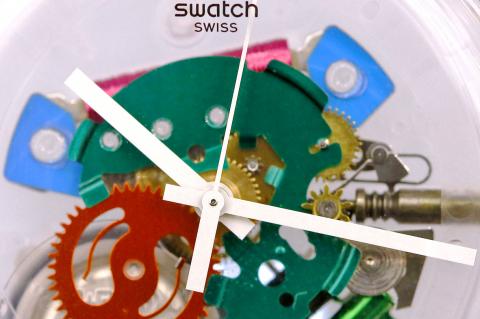Apple Inc’s iPod upended the music industry, and its iPhone knocked Nokia Oyj off its smartphone perch, but Swiss watchmakers breezily dismissed warnings that the technology giant’s new wristwatch gadget could do something similar to them.
“They are essentially transient products rather than items of enduring value,” one Swiss watch industry expert sniffed.
Franz Tuerler, owner of a luxury watch store on Zurich’s main shopping boulevard, Bahnhofstrasse, said the appeal of Apple watches would be to a different class of customer who prizes technology over prestige and emotional attachment.

Photo: Reuters
“I think the Apple Watch will be successful. But it’s not competition for the classic Swiss watch industry,” Tuerler said.
While the luxury end of the market might feel itself well insulated from the blast of competition from Apple, analysts are far from convinced that the industry can be complacent, especially at the more affordable end.
Vontobel watch industry analyst Rene Weber: “[Apple Watch] is the first convincing smartwatch, and we believe it will impact the entire watch industry, but mainly at the low-/mid-end price level.”
An industry source acknowledged that watches priced between 500 euros and 1,500 euros (US$650 to US$1,950) could feel the pinch.
Investors have singled out diversified industry heavyweight Swatch Group, which makes 20 percent of its sales in the low and mid-priced ranges, as most at risk.
Swatch shares traded 2.5 percent lower on the Zurich exchange after Apple spelled out its plans to offer three lines of watches — sport, standard and luxury versions — with prices starting at US$349 and set to ship in early next year.
Swatch’s shares have lost nearly 18 percent of their value so far this year, lagging an 8 percent rise in the Swiss market index, and analysts cite Apple’s market entry as the main reason.
The Swiss industry has so far taken a decision not to join, but to try and beat the smartwatch phenomenon. Not a single watchmaker has announced a deal with a technology company to work together on a smartwatch project.
Swatch has said several times it has all the knowhow to make “smart” watches and does not want to be dependent on a partner.
Swatch chief executive Nick Hayek said in a recent interview that the company prefers to go it alone with a launch next year of watches with smart fitness functions.
However, Apple Watch will be sending messages, playing music, and acting as a payment medium on top of health monitoring functions. The danger for the watchmakers is if Apple succeeds in redefining what people expect from a wristwatch.
Jean-Marc Jacot, chief executive of privately owned Parmigiani, founded in 1996, whose watches sell for an average 30,000 euros, does not see that as a threat.
“High-end consumers will buy Apple Watch, because it is Apple, but they should not stop buying classical watches. They will have both,” he said.

WEAKER ACTIVITY: The sharpest deterioration was seen in the electronics and optical components sector, with the production index falling 13.2 points to 44.5 Taiwan’s manufacturing sector last month contracted for a second consecutive month, with the purchasing managers’ index (PMI) slipping to 48, reflecting ongoing caution over trade uncertainties, the Chung-Hua Institution for Economic Research (CIER, 中華經濟研究院) said yesterday. The decline reflects growing caution among companies amid uncertainty surrounding US tariffs, semiconductor duties and automotive import levies, and it is also likely linked to fading front-loading activity, CIER president Lien Hsien-ming (連賢明) said. “Some clients have started shifting orders to Southeast Asian countries where tariff regimes are already clear,” Lien told a news conference. Firms across the supply chain are also lowering stock levels to mitigate

Six Taiwanese companies, including contract chipmaker Taiwan Semiconductor Manufacturing Co (TSMC, 台積電), made the 2025 Fortune Global 500 list of the world’s largest firms by revenue. In a report published by New York-based Fortune magazine on Tuesday, Hon Hai Precision Industry Co (鴻海精密), also known as Foxconn Technology Group (富士康科技集團), ranked highest among Taiwanese firms, placing 28th with revenue of US$213.69 billion. Up 60 spots from last year, TSMC rose to No. 126 with US$90.16 billion in revenue, followed by Quanta Computer Inc (廣達) at 348th, Pegatron Corp (和碩) at 461st, CPC Corp, Taiwan (台灣中油) at 494th and Wistron Corp (緯創) at

NEW PRODUCTS: MediaTek plans to roll out new products this quarter, including a flagship mobile phone chip and a GB10 chip that it is codeveloping with Nvidia Corp MediaTek Inc (聯發科) yesterday projected that revenue this quarter would dip by 7 to 13 percent to between NT$130.1 billion and NT$140 billion (US$4.38 billion and US$4.71 billion), compared with NT$150.37 billion last quarter, which it attributed to subdued front-loading demand and unfavorable foreign exchange rates. The Hsinchu-based chip designer said that the forecast factored in the negative effects of an estimated 6 percent appreciation of the New Taiwan dollar against the greenback. “As some demand has been pulled into the first half of the year and resulted in a different quarterly pattern, we expect the third quarter revenue to decline sequentially,”

ASE Technology Holding Co (ASE, 日月光投控), the world’s biggest chip assembly and testing service provider, yesterday said it would boost equipment capital expenditure by up to 16 percent for this year to cope with strong customer demand for artificial intelligence (AI) applications. Aside from AI, a growing demand for semiconductors used in the automotive and industrial sectors is to drive ASE’s capacity next year, the Kaohsiung-based company said. “We do see the disparity between AI and other general sectors, and that pretty much aligns the scenario in the first half of this year,” ASE chief operating officer Tien Wu (吳田玉) told an